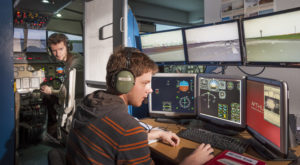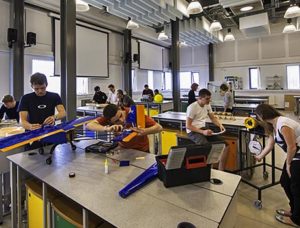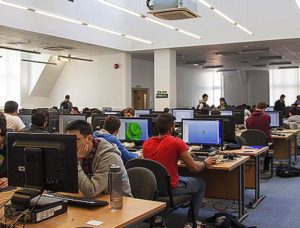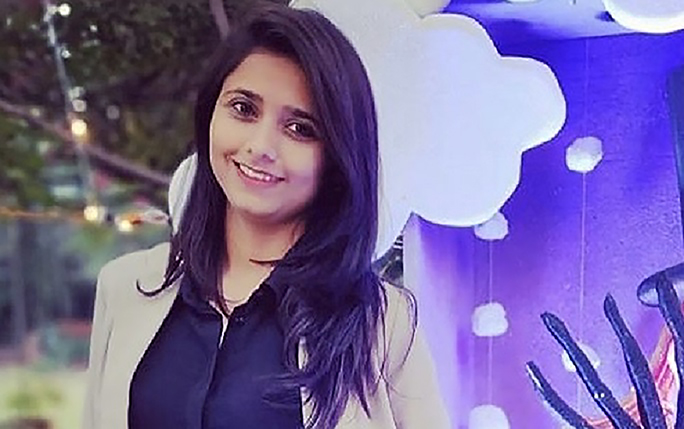Aerospace Engineering with Pilot Studies with a Year in Industry
UCAS code H404
- Study mode
- Full-time
- Duration
- 5 years
- Start date and application deadlines
-
- Start date
UCAS code H404
If you are interested in becoming either private or professional pilot, this is the programme for you.
The MEng is designed to offer students a greater depth and breadth of specialist knowledge in the core aerospace subjects with a range of advanced modules.
In addition to studying the core aerospace engineering topics outlined, you will also take the pilot studies modules and develop knowledge, skills and experience of flying. As well as the flight training, pilot studies students also have access to and use of the students pilots lab and can join the Flight Simulation Group (FSG). Study Aerospace Engineering and by the end of your time at Liverpool, you will be able to show that you can now design, build, test and fly an aircraft.
As an aerospace engineering student, you will experience a wide variety of topics and modes of study, whether it be conducting research, analysing reports or designing and building an aircraft. You will have have the opportunity to study a wide range of topics during your time at Liverpool such as aerodynamics, aerostructures, flight dynamics and control, propulsion systems, avionics, aerospace materials and aircraft design.
Aerospace engineers design, analyse, build, test and maintain vehicles, their sub-assemblies and components as well as their associated systems that fly. Flight is not limited to simply within the Earth’s atmosphere, and can also be outside of it.
On this year in industry programme, you will spend year three of this programme on a year-long placement with an approved company/organisation. During this time, you will develop work-based transferrable skills and professional competences leading to enhanced employability which will make you well placed to take up opportunities in project-based, research and management roles, both within the aerospace sector as well as other engineering industries and beyond. The year in industry is dependent upon placements being available and is subject to your performance in previous years.
All of our BEng/MEng degree programmes are accredited, or preparing for accreditation, by at least one professional engineering institution, providing you with a solid foundation for your career. An MEng degree in aerospace, civil and mechanical engineering from Liverpool, satisfies all of the academic requirements for registration as a Chartered Engineer (CEng). We have excellent links with the professional engineering institutions and benefit from their support.
All mechanical engineering programmes are accredited, or pending accreditation, by the Institution of Mechanical Engineers. This is the professional body for Mechanical Engineers. Our programmes are a recognised qualification on the route to Chartered Engineer status.
The Royal Aeronautical Society is licensed by the Engineering Council to accredit academic programmes that provide the exemplifying level of understanding, knowledge and skills to underpin professional competence to help graduates on their way to registration as Chartered Engineers (CEng) or as Incorporated Engineers (IEng).

We’re proud to announce we’ve been awarded a Gold rating for educational excellence.
Discover what you'll learn, what you'll study, and how you'll be taught and assessed.
You will study the core engineering topics that provide a firm background and understanding of aerospace engineering, in addition you will also study pilot studies modules and develop your knowledge, skills and experience of flying.
The pilot studies module is based on the Private Pilot’s License (PPL) ground school syllabus. It is studied alongside either the mandatory 20-hour flight training programme for fixed-wing flying (aeroplanes) or the 20-hour flight and ground training programme for rotary-wing flying (helicopters). For the latter, the 20-hour training programme is divided between 10.5 hours flight training and 9.5 hours of helicopter-relevant ground school.
Programme details and modules listed are illustrative only and subject to change.
Year two includes a two-day flight test course in the national flying laboratory aircraft. In year two, the pilot studies modules are based on the Air Transport Pilot’s Licence (ATPL) ground school syllabus.
Students will continue to study the core engineering topics as well as taking part in a two-day flight test course in the national flying laboratory aircraft.
Programme details and modules listed are illustrative only and subject to change.
A life-changing experience highly valued by employers. You will be supported in finding and applying for a placement in an organisation which could range from a local small/medium-sized enterprise to a global blue chip engineering company. As with summer placements, it’s up to you.
Year in industry placements must be for a minimum of 40 weeks, and must overlap with the academic year in order that assessments can be managed smoothly. The placement year includes a variety of assessments including a reflective journal based on engineering competencies associated with the Engineering Council’s professional standards and learning outcomes. Overall, the placement year accounts for 10% of the overall degree classification. As year in industry placement students are acting as ambassadors for the University whilst on these paid placements, they must have performed at a high academic level in the year before the placement in order to be considered eligible, otherwise the placement year would have to be taken by suspension of studies and would not contribute towards the degree mark.
Students normally go on their year placement during their third year of study (after successful completion of two years), although for MEng students it can be undertaken after completion of three years of study.
Applicants should note that industrial placements are highly sought after and competition to be accepted into one can be significant. They therefore cannot be guaranteed. Students who fail to secure a suitable placement offer will transfer back to the standard version of the programme without a year in industry.
Year in industry students are expected to achieve a 1st or 2:1 class degree.
| Compulsory modules | Credits |
|---|---|
| SCHOOL OF ENGINEERING YEAR IN INDUSTRY (ENGG299) | 120 |
Programme details and modules listed are illustrative only and subject to change.
During your fourth year you will undertake an individual project. This provides you with the opportunity to conduct independent research and/or develop innovative concepts in your preferred technical area of interest.
Programme details and modules listed are illustrative only and subject to change.
You will study a range of advanced modules that will give you further in-depth knowledge which you will secure by demonstrating your knowledge and understanding in the Capstone Design Project.
Programme details and modules listed are illustrative only and subject to change.
We are leading the UK’s involvement in the international Conceive-Design-Implement-Operate (CDIO) initiative – an innovative educational framework for producing the next generation of engineers.
Our degree programmes encompass the development of a holistic, systems approach to engineering. Technical knowledge and skills are complemented by a sound appreciation of the life-cycle processes involved in engineering and an awareness of the ethical, safety, environmental, economic, and social considerations involved in practicing as a professional engineer.
You will be taught through a combination of face-to-face teaching in group lectures, laboratory sessions, tutorials, and seminars. Our programmes include a substantial practical component, with an increasing emphasis on project work as you progress through to the final year. You will be supported throughout by an individual academic adviser.
Assessment takes many forms, each appropriate to the learning outcomes of the particular module studied. The main modes of assessment are coursework and examination. Depending on the modules taken, you may encounter project work, presentations (individual and/or group), and specific tests or tasks focused on solidifying learning outcomes.
We have a distinctive approach to education, the Liverpool Curriculum Framework, which focuses on research-connected teaching, active learning, and authentic assessment to ensure our students graduate as digitally fluent and confident global citizens.
The Liverpool Curriculum framework sets out our distinctive approach to education. Our teaching staff support our students to develop academic knowledge, skills, and understanding alongside our graduate attributes:
Our curriculum is characterised by the three Liverpool Hallmarks:
All this is underpinned by our core value of inclusivity and commitment to providing a curriculum that is accessible to all students.
The qualifications and exam results you'll need to apply for this course.
| Qualification | Details |
|---|---|
| A levels |
BBC (including Mathematics: B and ) |
| BTEC Level 3 national extended diploma |
DDM and Mathematics grade B at A Level. |
| BTEC combinations |
BTEC National Extended Certificate M plus BB including Mathematics grade B and a science grade B at A level. |
| Welsh Baccalaureate Advanced |
C in the Welsh Baccalaureate, plus BB at A level to include Mathematics grade B and a science grade B at A level. |
| Access |
Pass relevant Access to HE Diploma with 45 Level 3 credits with 27 at Distinction and 18 at Merit |
Studying with us means you can tailor your degree to suit you. Here's what is available on this course.
University of Liverpool students can choose from an exciting range of study placements at partner universities worldwide.
Immerse yourself in Chinese culture on an optional additional year at Xi'an Jiaotong Liverpool University in stunning Suzhou.
Spend a summer abroad on a study placement or research project at one of our worldwide partner institutions.
This course is also available without an included year in industry.
View Aerospace Engineering with Pilot Studies MEng
To spend a year in industry, you'll need to secure a placement with an organisation. If you're unable to find a placement, you'll continue with the standard version of the course without a year in industry.
Every student at The University of Liverpool can study a language as part of, or alongside their degree. You can choose:
This course is also available as a four year BEng (Hons) programme.
View Aerospace Engineering with Pilot Studies with a Year in Industry BEng (Hons)
The School of Engineering has world-class, modern, engineering teaching and learning facilities. Within the School there are traditional lecture theatres as well as teaching laboratories, PC teaching centres, smaller study rooms and one of the University’s largest PC teaching/study rooms with over 160 high-specification workstations with specialist engineering software installed. The School also houses impressive specialist engineering research laboratories and research facilities that provide the setting for student practical work and many student projects.






From arrival to alumni, we’re with you all the way:
I've never looked back since picking Liverpool. It has everything I need in terms of academics and student life. The flight simulators also caught my eye. I know employers see this as a very valuable degree.

Want to find out more about student life?
Chat with our student ambassadors and ask any questions you have.
As a graduate of aerospace engineering, you will be equipped with the skills to work in the development and maintenance of aircraft, satellites, and space vehicles.
Typical types of work our graduates have gone on include:
Recent employers of our graduates are from the following industries and companies:
4 in 5 of our engineering students find their main activity after graduation meaningful.
(Graduate Outcomes, 2018-19.)
Hear what graduates say about their career progression and life after university.

Neha is the founder of Aviotron Automations, an education technology company that focuses on imparting practical education for K-12 level using trending technologies such as design thinking methodology, space education, aeromodelling and 3D printing.
Your tuition fees, funding your studies, and other costs to consider.
Full-time place, per year - £9,535
Year in industry fee - £1,905
Year abroad fee - £1,430 (applies to year in China)
Full-time place, per year - £29,100
Year in industry fee - £1,905
Year abroad fee - £14,550 (applies to year in China)
The tuition fees shown are correct for 2025/26 entry. Please note that the year abroad fee also applies to the year in China.
Tuition fees cover the cost of your teaching and assessment, operating facilities such as libraries, IT equipment, and access to academic and personal support. Learn more about paying for your studies.
We understand that budgeting for your time at university is important, and we want to make sure you understand any course-related costs that are not covered by your tuition fee. This includes the cost of flight training, an aircraft checklist, and a study pack. All safety equipment, other than boots, is provided free of charge by the department.
Pilot studies students should expect to cover the following additional costs:
Stationery and equipment:
All essential safety equipment, other than boots, is provided free of charge by the department.
Flight training:
There is a one-off up-front fee of approximately £4,700 inclusive of VAT for training using the Tomahawk aircraft and £5,300 inclusive of VAT for the Warrior aircraft. A total of 20 hours of ground and airborne rotary-wing flight training is conducted by HELISPEED at Blackpool International Airport. There is a one-off up-front fee of £9112.20 inclusive of VAT for this training.
Please note, these prices are correct at the time of publication but may change at any time. Please check with the School for the correct pricing.
Study pack:
Costs are only for those doing their flight training at Liverpool Flying School. Students have to pay for their own travel to and from the airport.
Students are also required to purchase a study pack costing approximately £100 (for the smaller pack) or £210 (for the larger pack) and an aircraft checklist for £10 (2022 entry costs).
We offer a range of scholarships and bursaries that could help pay your tuition and living expenses.
If you’re a UK student joining an undergraduate degree and have a household income below £35,000, you could be eligible for a Liverpool Bursary worth up to £2,000 for each year of undergraduate study.
Apply for an Asylum Seekers Scholarship and you could have your tuition fees paid in full and receive help with study costs. You’ll need to have applied for asylum in the UK, or be the dependant of an asylum seeker, and be joining an eligible undergraduate degree.
If you’ve spent 13 or more weeks in Local Authority care since age 14, you could be eligible for a bursary of £3,000 per year of study. You’ll need to be a UK student joining an eligible undergraduate degree and be aged 28 or above on 1 September in the year you start.
Are you a UK student with a Black African or Caribbean heritage and a household income of £25,000 or less? You could be eligible to apply for a Cowrie Foundation Scholarship worth up to £8,000 for each year of undergraduate study.
If you’re a UK student identified as estranged by Student Finance England (or the equivalent UK funding body), you could be eligible for a bursary of £1,000 for each year of undergraduate study.
Joining a School of Biosciences degree and have a household income of less than £25,000? If you’re a UK student, you could apply to receive £4,500 per year for three years of your undergraduate course.
Do you live in the Liverpool City Region with a household income of £25,000 or less? Did neither of your parents attend University? You could be eligible to apply for a Nolan Scholarship worth £5,000 per year for three years of undergraduate study.
Are you a UK student with a household income of £25,000 or less? If you’ve participated in an eligible outreach programme, you could be eligible to apply for a Rigby Enterprise Award worth £5,000 per year for three years of your undergraduate degree.
Are you a UK student with a household income of £25,000 or less? Did neither of your parents attend University? You could be eligible to apply for a ROLABOTIC Scholarship worth £4,500 for each year of your undergraduate degree.
Apply to receive tailored training support to enhance your sporting performance. Our athlete support package includes a range of benefits, from bespoke strength and conditioning training to physiotherapy sessions and one-to-one nutritional advice.
Joining a degree in the School of Electrical Engineering, Electronics and Computer Science? If you’re a UK student with household income below £25,000, you could be eligible to apply for £5,000 a year for three years of study. Two awards will be available per academic year.
If you’re a young adult and a registered carer in the UK, you might be eligible for a £1,000 bursary for each year of study. You’ll need to be aged 18-25 on 1 September in the year you start your undergraduate degree.
Use our handy chatbot for your Clearing enquiries.
Last updated 17 June 2025 / / Programme terms and conditions